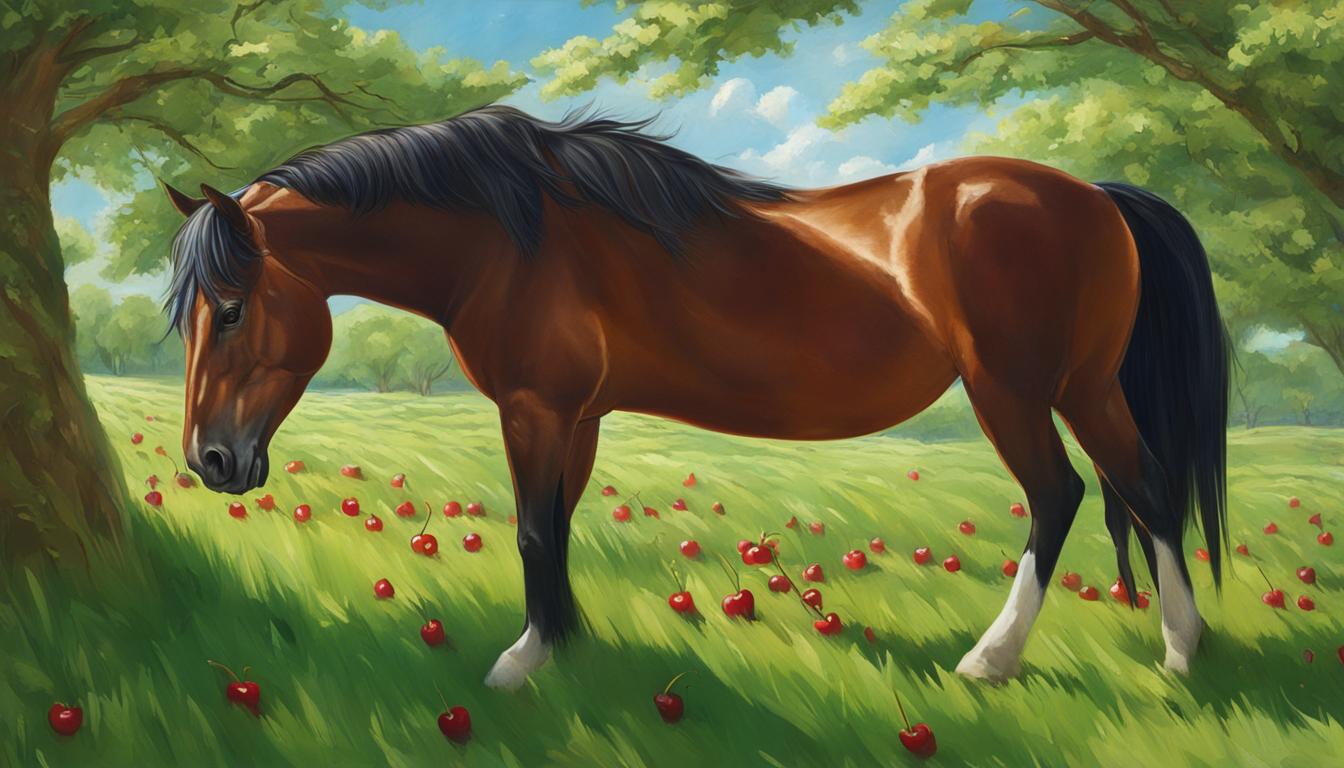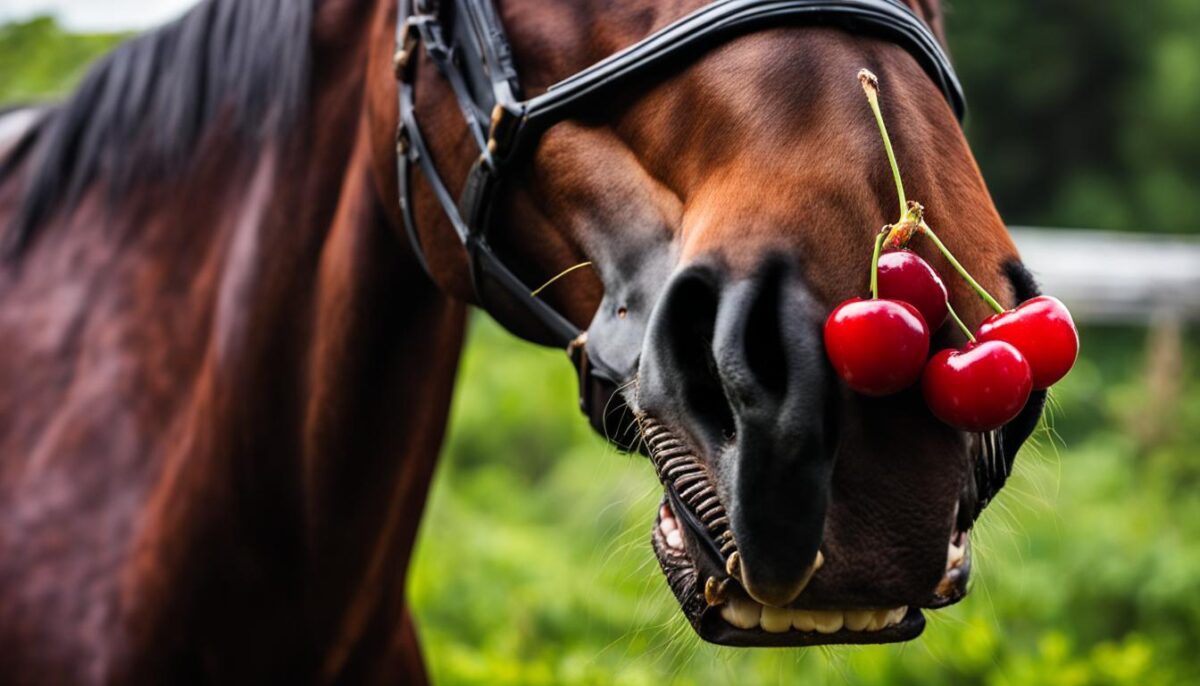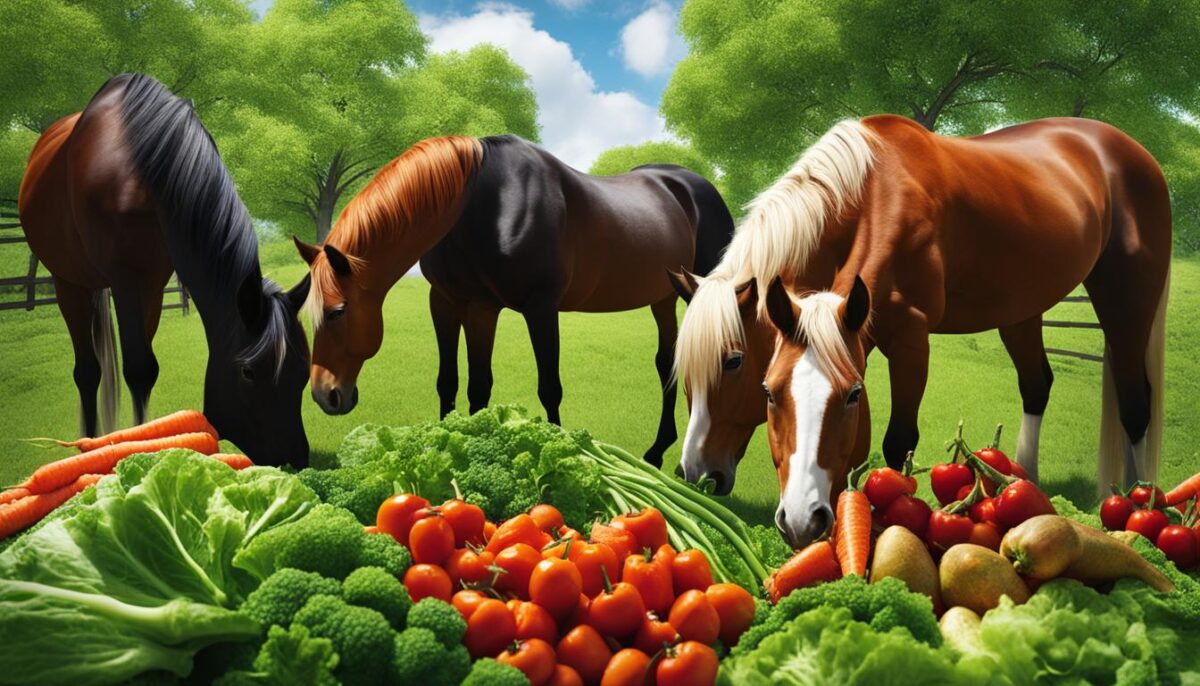As a horse owner, you might wonder if your equine friend can snack on cherries just like they do on apples. Well, cherries can indeed be a part of a horse’s diet! This article will discuss the role of cherries and other fruits in equine nutrition and provide some tips for offering your horse safe and tasty treats.
Key Takeaways
- Cherries are a great source of vitamins A and C and can be a sweet treat for horses.
- Always wash cherries thoroughly and remove pits and stems before feeding them to your horse.
- A diverse diet, including grains, fruits, and vegetables, is essential for optimal horse health.
- Other safe fruits for horses to enjoy include bananas, apples, pineapples, and oranges.
- Vegetables like pumpkins, cucumbers, and green beans can also be part of a horse’s diet.
- Some fruits, such as persimmons, rhubarb, and nightshade family fruits, should be avoided.
The Importance of a Balanced Equine Diet
A balanced equine diet is crucial for maintaining optimal horse health. In addition to hay and grains, incorporating a nutritional variety of fruits and vegetables into a horse’s diet can provide essential vitamins and minerals. This section will explore your horse’s nutritional needs, as well as how to combine grains, fruits, and vegetables for optimal health.
Understanding Your Horse’s Nutritional Needs
Each horse has unique nutritional requirements based on factors such as age, weight, activity level, and overall health. A balanced diet should consist of forage (hay or grass), grains, and water as staples, along with controlled portions of fruits and vegetables for added variety and nutrients. By understanding your horse’s specific needs, you can tailor their diet to promote overall well-being and prevent nutritional imbalances.
Combining Grains, Fruits, and Vegetables for Optimal Health
Hay and grains form the foundation of a horse’s diet, but the inclusion of select fruits and vegetables can improve digestion and provide critical nutrients. Below is a table summarizing nutritious options for your horse:
| Food | Benefits |
|---|---|
| Bananas | High in energy and potassium |
| Pumpkins | Source of Vitamin A and safe seeds |
| Carrots | Rich in Vitamin A and fiber |
| Apples | Packed with vitamins and natural sugars |
| Green beans | Low-calorie source of vitamins and minerals |
Ensure that these treats are offered in small, clean, and well-chopped pieces to reduce the risk of choking. Additionally, always introduce new foods gradually and monitor your horse for any adverse reactions. Although fruits and vegetables can be a delicious and nutritious addition to your horse’s diet, moderation is key to maintaining a balanced and healthy equine lifestyle.
Can Horses Eat Cherries?
Yes, your horse can have cherries as an occasional treat. Just like us, horses **enjoy a little sweetness**, and cherries are not just safe but also beneficial for them. Packed with vitamins A and C, cherries can be a tasty, refreshing snack for our equine friends. However, it is important to remember the proper way of feeding cherries to horses to ensure their cherry safety for equines.
Always prepare these tiny fruits carefully: remove the stems and pits, wash them, cut them in half, and make sure they’re clean and easy for your horse to eat. The following table will help you understand the steps in preparing cherries for your equine friend:
| Step | Description |
|---|---|
| 1 | Wash the cherries thoroughly to remove any chemicals. |
| 2 | Cut each cherry in half to expose the pit. |
| 3 | Remove the pit and stem from each cherry half. |
| 4 | Offer the clean, halved cherries to your horse. |
By following these simple steps, you can avoid any risks, like choking or your horse accidentally eating something they shouldn’t. So, go ahead and incorporate cherries into your horse’s diet as a tasty treat, but remember to keep their safety and well-being in mind.
Other Fruits Safe for Horses to Enjoy
In addition to cherries, there are several other fruits that can be safely added to your horse’s diet for both nutrition and variety. Some of the most popular choices include bananas, apples, pineapples, and oranges. Let’s take a closer look at the benefits of these fruits for horses.
The Sweet Benefits of Bananas and Apples
Bananas are a favorite treat for many horses and are packed with potassium, an essential nutrient for their muscles and overall health. Apples, on the other hand, are a classic and healthy snack that is often used as a reward during training sessions. Both fruits are excellent sources of dietary fiber and should be fed in moderation.
Pineapples and Oranges: A Citrus Treat for Equines
Citrus fruits, such as pineapples and oranges, can also be included in your horse’s diet for a nutritious boost. These fruits are rich in vitamin C and antioxidants, which promote a healthy immune system. Just like cherries, be sure to remove the peels and seeds, and chop the fruits into small pieces to ensure they can be safely consumed by your horse.
Feeding a variety of safe fruits for horses can provide added vitamins, minerals, and flavor to their regular diet. Keep the following guidelines in mind when preparing and serving fruits to your equine friends:
- Always remove any stems, pits, seeds, or peels before serving
- Wash the fruits thoroughly
- Cut the fruits into bite-sized pieces to prevent choking hazards
- Introduce new fruits gradually and monitor for any signs of digestive upset
Vegetables in a Horse’s Diet
Incorporating vegetables into your horse’s diet can provide a wide range of nutrients and add some much-needed variety to their meals. From pumpkins to cucumbers, there are numerous veggie options that can contribute to your horse’s well-being. Offering organic choices, such as green beans and lettuce, ensures your equine friend consumes the freshest and safest produce available.
From Pumpkins to Cucumbers: Nutritious Veggie Options
Introducing vegetables for horses can be both a tasty and beneficial addition to their eating plan. Pumpkins are packed with Vitamin A, which is essential for maintaining healthy eyesight and immune function. Cucumbers, on the other hand, are rich in Vitamin C – strengthening the horse’s immunity and supporting tissue repair. When feeding horses vegetables, remember to cut them into small pieces to prevent choking hazards and ensure an enjoyable snacking experience.
Green Beans and Lettuce: Organic Choices for Horses
An organic horse diet can be achieved by including organic vegetables such as green beans and lettuce. These options are not only safe but must be grown without the use of harmful chemicals. By choosing organic produce, you can ensure your horse is consuming the best quality vegetables available. Once again, serve these nutritious greens in small, bite-sized portions, keeping your horse’s diet as natural and safe as possible.
Fruits to Avoid in Your Horse’s Diet
While many fruits are safe for horses, some should never be fed to them. Some harmful fruits for horses include persimmons, rhubarb, and fruits from the nightshade family. These fruits can cause serious health issues, so it’s crucial to understand the equine diet restrictions and choose safe fruit options for your horse.
Persimmons pose a risk to your horse due to their seeds, which can cause blockages in their digestive system. Rhubarb contains high levels of oxalic acid, which can lead to kidney failure in equines. Fruits from the nightshade family, such as tomatoes and eggplants, can be toxic to horses, causing symptoms like colic and respiratory issues.
Remember to always provide your horse with horse-friendly fruits and treats in moderation. By avoiding toxic foods for equines and offering a balanced diet, you can help keep your horse healthy and happy.
FAQ
Can horses eat cherries as part of their diet?
Yes, horses can enjoy cherries as an occasional treat. Make sure to wash the cherries thoroughly, remove the pits and stems, and cut them in half before feeding them to your horse.
What other fruits are safe for horses to eat?
Horses can safely enjoy fruits such as bananas, apples, pineapples, and oranges. Be sure to peel the fruits and remove any seeds before feeding them to your horse.
Can horses eat vegetables, and what types are recommended?
Yes, vegetables can also be a healthy part of a horse’s diet. Some suggested options include pumpkins, cucumbers, green beans, and lettuce. Be sure to feed them in small, clean pieces and opt for organic produce when possible.
Are there any fruits that should be avoided in a horse’s diet?
Yes, some fruits can be harmful to horses, such as persimmons, rhubarb, and fruits from the nightshade family. Avoid feeding these fruits to your horse to ensure their safety and well-being.
How does a balanced equine diet help maintain horse health?
A balanced diet that includes grains, fruits, and vegetables provides horses with essential nutrients for optimal health. Varying their diet can keep them happy, healthy, and avoid nutritional deficiencies.


